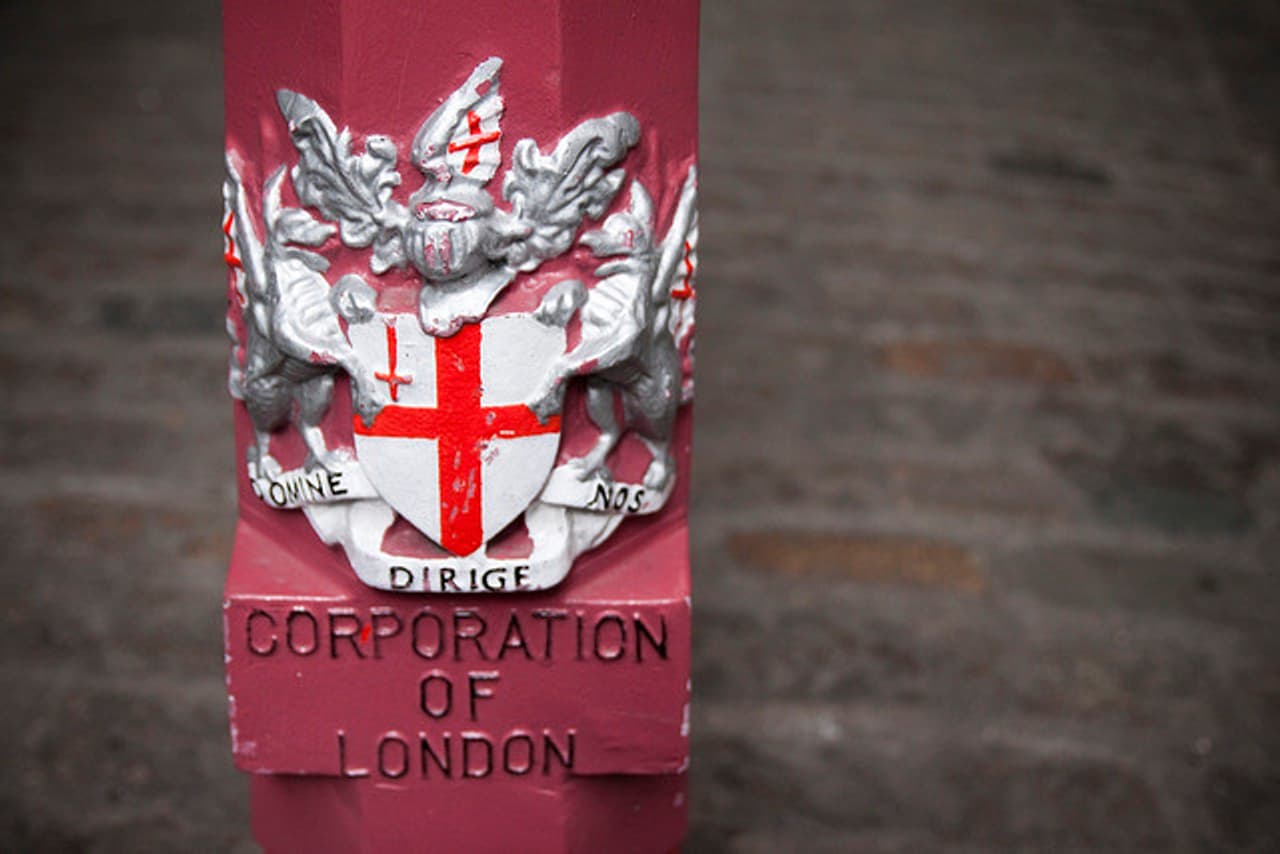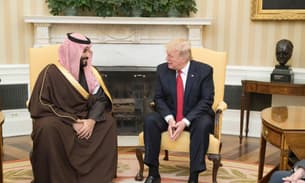
Streets paved with gold: The council that works for banks
Shielding the City. The City of London Corporation’s coat of arms.
The large glass of white wine that washed down a hearty plate of venison in the cosy confines of an Italian restaurant may have contributed to the City of London Corporation official dropping his guard.
‘The whole Corporation lobbies,’ the official let slip between mouthfuls. He might have added throughout time.
For almost 1,000 years, the City of London Corporation has resisted virtually every attempt by monarchs, governments or ‘subjects’ to rein in its vast financial wealth and influence. From the execution of Peasant Revolt leader Wat Tyler by the Lord Mayor of London and his men in 1381, to the dispatching from the City to Northern Ireland of rural refugees forced off their land in 17th-century land reforms, the Corporation has long influenced the course of British history.
Today, the Corporation makes its mark through perhaps more sophisticated, well resourced and hospitable diplomacy. Its lines of communication with power brokers here and abroad are well established and manifold.
But its aim, charitable endeavours notwithstanding, is the same as it ever was: retaining the City’s status as a premier-league financial centre.
Rarely has this mission been so sorely tested. London’s role in a series of financial scandals, including Lehman Brothers collapse, Bernie Madoff’s $50bn pyramid scheme, AIG’s failed derivative operation and most recently the Barclays’s LIBOR scandal, have diminished the Square Mile’s international reputation. The City’s global influence is now at risk with the introduction of new European Union financial regulatory reform. Rarely has the City of London so needed the Corporation’s lobbying power.
Such is the Corporation’s political and economic influence that today some suggest the British state, rather than controlling the Corporation, is in fact subservient to it.
And it’s not just about reputation management. The Corporation is also at the forefront of a massive push to persuade the Chinese authorities to allow London’s Financial centre to trade Chinese currency products.
Today the City’s financial clout is already considerable, boasting a 37% share of the world’s foreign exchange trade, 70% of Eurobond turnover and 46% of the over-the-counter derivative market. If the Chinese deal is sealed it would be the most significant financial market development seen in the City for over 50 years.
The human bridgehead in this task is its new ‘lobbyist-in-chief’, Mark Boleat, appointed as chairman of the pivotal Corporation policy and resources committee in May. Behind Boleat sit parliamentary lawyers, public affairs staff, 43 media operatives, a 50-strong economic development team, numerous researchers and hospitality organisers.
This public affairs machine costs over £10m, according to the Bureau’s calculations. The Corporation disputes this figure.
Related article: Revealed – The £93m City lobby machine
Boleat is the Corporation’s de facto prime minister, and will, if he is anything like Stuart Fraser, his recent predecessor, mix with the great and the good. Fraser was awarded a CBE in the Queen’s birthday honours list for services to the Square Mile.
Until his departure, Fraser was probably the City’s most energetic lobbyist. He had contact with George Osborne, Treasury ministers and senior Treasury officials 22 times in the 14 months up to March this year, according to documents obtained through Freedom of Information by the Bureau. In the space of two months alone last year, Fraser sent Osborne three letters, and received a personal response from the chancellor.
Citing a recent trip to China, Fraser complains that the UK’s City watchdog, the Financial Services Authority, takes too long authorising Chinese and Indian banks to operate in the UK. ‘The FSA’s rules are perceived to run counter to the message that the UK welcomes FDI [foreign direct investment].’
Updating Osborne on his meetings with senior US politicians, regulators and financiers, Fraser says: ‘one leading global insurance brokerage… explained that their current cost of compliance in the UK is higher than the combined cost of compliance in the other 99 countries in which they operate’.
Letter from Stuart Fraser to the Chancellor
In another letter informing the Chancellor personally of fresh Corporation research, Fraser writes that international business is uncertain about the UK’s stance on regulation, taxation and labour mobility.
He adds: ‘Over the next few years we need to work together to safeguard London and the UK’s competitiveness as a location of choice for global financial services.’
In a similar vein, he continued: ‘We must ensure that we do not undertake short-sighted policies that threaten to lose the industries whose presence in London and the UK delivers such valuable benefits to the UK economy.’
Last November Fraser wrote to Mark Hoban, the Treasury minister responsible for the City, suggesting a migration clampdown ‘has had a negative impact on the UK’s attractiveness for international firms’ leading to major businesses postponing expansion and growth plans. Fraser suggested to Hoban, whose wife, Fiona works for the Corporation’s legislative scrutiny department, that ‘intra-company transfers’ should remain outside government migration rules.
Such is the Corporation’s political and economic influence that today some suggest the British state rather than controlling the Corporation, is in fact subservient to it.
This impression is partly fuelled by dutiful speeches made annually by the prime minister, the chancellor, the Mayor of London, and other dignitaries who separately outline their plans and visions at sumptuous annual set-piece banquets before City fathers at the Guildhall or nearby at the spectacular Mansion House.

Intoxicating power
The importance of these occasions is underlined in a leaked financial statement from the Corporation’s so-called City’s Cash fund – one of a number of Corporation accounts.
It reveals that the City of London Corporation owns the freehold to some of the world’s most valuable real estate, not just within its walls where it acts as landlord to global banks, brokers and insurers – but also large swaths of London’s West End.
All told, it holds assets worth in excess of £3bn and generates net revenues of £226.4m.
The City’s Cash fund is where the Corporation funnels much of the rents from its valuable real estate portfolios and other investments. Around £600m is carried forward within the fund from one year to the next.
The fund’s annual report is only circulated to City councillors, aldermen and officials. In its Notes section, it clearly states the aim of major national set-piece occasions and small receptions – where politicians and City figures meet in private – is ‘to increase the emphasis on complementing hospitality with business meetings consistent with the City Corporation’s role in supporting the City as a financial centre’.
In a statement, the City of London suggested it does not lobby but ‘argues the case for London’.
City’s Cash fund spent £4.66m in 2007 on ‘Ceremony’, according to the accounts, and another £7.16m servicing the Lord Mayor’s banqueting and ‘shrievalty’ duties.
Not all the Ceremony and Lord Mayor’s £11.82m budget is spent on ‘banquet lobbying’ – but a significant slice is. The effect these events have on those who supposedly rule the UK is mesmerising, according to Father William Taylor. Taylor spent several years between 2001 and 2008 as a City of London Corporation Common Councillor.
‘You are getting in a room all the powerful people you want to influence,’ he said. ‘You are getting them handsomely drunk. You are applauding them. It’s literally intoxicating. The amount of booze consumed is vast if you wish to. It’s the way power operates. It’s probably underestimated as a tool for cementing consensus and support for the Corporation.’
Lobbying firepower
What may also be underestimated is the lobbying firepower deployed by the City in parliament. Sitting facing the Speaker’s chair is Paul Double, a City of London official known as the Remembrancer. Described by Nicholas Shaxson in his book Treasure Islands as ‘the world’s oldest institutional lobbyist’, the Remembrancer scours every piece of parliamentary legislation. This unique post’s existence dates back to Cardinal Wolsey’s attempt to introduce higher taxes on the City. It was, notes Shaxson, something the City never forgot – hence the moniker the Remembrancer.
Today he scrutinises every legislative wrinkle to ensure the Corporation’s interests are never undermined again. The Remembrancer enjoys an annual budget of £6m– a portion of which is spent on his six in-house lawyers.
Lower business taxes
The Rembrancer’s Office has submitted evidence to 16 separate select committees in the past 18 months, including the Treasury’s Tax Principles report published last year. The City of London Corporation’s evidence stated: ‘Several insurance companies … have already changed their domicile and there is speculation that some major UK-based banks are assessing the benefits or otherwise of being domiciled in the UK. Furthermore, some other institutions, including US investment banks, have already moved away from their previous settled view that London is the best placed centre for their operations in Europe, the Middle East, Africa and in some cases Asia as well.’
To avert what it warned could be a significant exodus of banks and insurers from London, the City suggested the government communicate that the UK is ‘open for business’ with ‘a phased reduction in rates of taxation’. George Osborne responded with his recent Budget, which included sharp reductions in corporation tax as well as a £500m tax break for insurance companies.
Related article: Insurance industry weakens pension scheme for low paid
In a statement, the City of London suggested it does not lobby but ‘argues the case for London’. This, it says, includes helping to develop the London Underground network and ‘keeping up the pressure to get the go-ahead for Crossrail’. Though, in return for a £250m contribution to the £16bn project, the Corporation now receives £10m from taxpayers each year in the form of the ‘City Offset’.
The City of London makes no apology for ‘promoting the competitiveness of [finance] as a whole so that this industry will thrive globally – and underpin jobs, prosperity and tax revenue’.
‘Crucially,’ it adds, ‘we do not “lobby” for individual firms, deals or people. We are in contact with all political parties – both in and out of office and act rather like a trade body but across a broader range – and specifically without duplicating the excellent work of trade bodies.’
Ruthless determination
The Corporation has survived and thrived thanks to its public affairs operatives, lawyers, policy, research and economic development officers, the army of staff who organise lavish City events, and the senior members of the organisation’s Policy and Resources Committee.
‘Individually, the people involved in the City were decidedly reasonable and approachable,’ Taylor stressed. ‘But the system that shaped these relationships was profoundly corrupting and were part of an oppressive system that we all live within. We don’t see it for what it is.’
The Corporation official, his slightly overcooked venison discarded, mused over coffee that perhaps in 200 years there might be another industry that replaces finance to give the Square Mile global pre-eminence: a branch of science or technology perhaps.
Up until now, the City’s power and influence has focused on ensuring the UK has the perfect micro-climate for being the world’s money hub.
In this respect, the Corporation has been stupendously successful. If its lobbying power can survive and thrive through a blizzard of public outrage, European regulation and the rise of China, it will be its most remarkable achievement to date.
About the City of London
The City of London Corporation is a unique institution. It is a local government authority, property investment company and financial industry advocate. Constitutional experts such as Lord Glasman suggest the Corporation holds a unique position in British life, removed from the nation state, thanks to historic precedent.
As a local authority, the Corporation receives £698m from business ratepayers, of which £649m goes back to central government. This leaves the Corporation nearly £50m to pay for policing and local services such as libraries. It is responsible for maintaining several bridges across the Thames and subsidising the Barbican arts centre. It also looks after Hampstead Heath and Epping Forest.
The majority of its revenues, however, come from its vast property portfolio in the City and West End plus other long held investments. The Corporation’s assets are worth over £3bn.
The Corporation represents the interests of its largest residents – financial firms who uniquely, and controversially, enjoy the vote in local elections.
To ensure its interests are not harmed in any way, the Corporation monitors and scrutinises national and international policy through a dedicated department known as the Remembrancer.
Separately, it lobbies for financial regulation that it argues helps London thrive as a global financial hub. Members of its powerful policy and resources committee are the primary focal points for this, supported by a well resourced research department and generous budget for lavish hospitality.
It ‘operates on a non-party political basis’ through its Lord Mayor, Aldermen and members of the decision-making body the Court of Common Council. The Council is made up of elected members from the City’s 25 wards and covers a wide range of professional and City interests. Aldermen are also elected and represent their wards.
The Lord Mayor is elected annually, the main role being that of ambassador for all UK-based financial and professional services.




